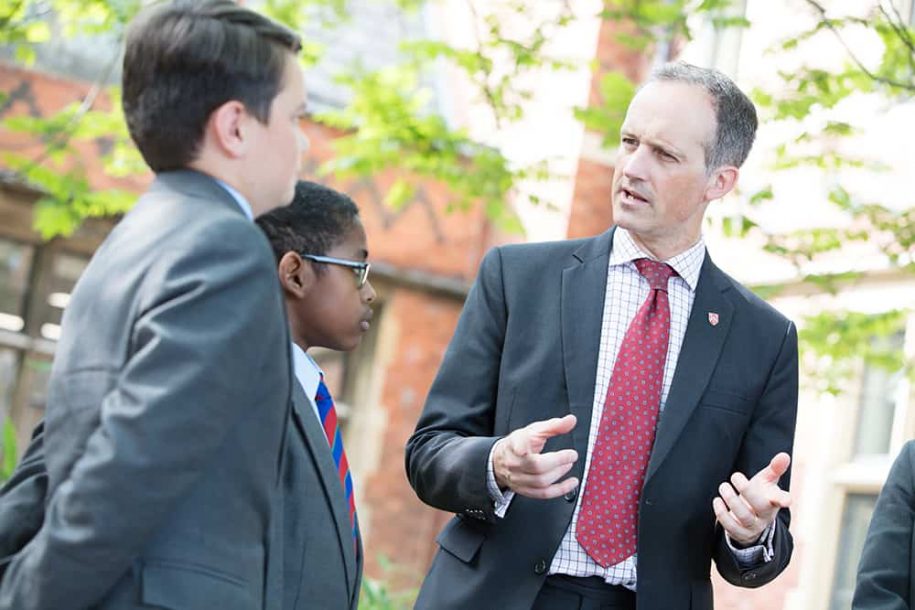Moral standards in a post-truth world

Every week, we meet together as a school on Tuesdays and Fridays. There are very few schools of our size who are ever able to meet as a whole community, for want of a venue of sufficient size. The Hodson Hall and Extension allow over 1000 of us to share the achievements of our community and to focus on the same topics and messages.
Friday is the Headmaster’s assembly day and although I don’t speak every week to the school – last week, for example, we heard 18 poems from the winners of our Poetry Competition – I naturally think very carefully about the messages that I want the boys to hear. From time to time in this blog, I will therefore share what I have chosen to talk about with the boys and you might wish to continue the conversation in order to help them develop their ideas.
I have noted in my two terms that LGS boys are very politically and socially aware. Brexit was a huge topic of conversation last summer, and the US Presidential Election has been hotly debated, both formally and also in tutor groups. The boys’ reaction to the Election of President Trump was a mixed one of incredulity and concern. They had followed the lurid international press coverage of statements made during his campaign and understood the revulsion that many in this country felt when confronted with a message of division and intolerance.
Truth appears to have become less important in politics than opinion. In the social media era in which we live, it has never been easier for us to express our opinions. A phrase one hears a great deal these days is “I’m entitled to my opinion”. There’s nothing wrong with this sentiment if it comes from having considered both sides of an argument. However, the ways in which we are consuming the media make this less likely. In the US, analysis of the election campaign showed how voters tended to get their news from one favoured outlet which represented their existing political perspective, such as Fox News, but the social media angle is more interesting when thinking about your sons. Facebook’s algorithms are designed to give you more of what you like; in other words, social media are highly unlikely to present your son both sides of any argument.
The risk of the “I’m entitled to my opinion” culture is that some believe that we have the right to share offensive opinions without considering who might be offended. I am convinced that we have to stand up against this with our sons and promote the value of compromise, of tolerance and of understanding the different perspectives of others. Above all, we must reject the idea that it is acceptable to say the vilest things as long as you win.
In the days following Trump’s victory, he toned down his rhetoric a little and some commentators made the point that “he’s not going to be as bad as you think – he was just saying this to get elected. He doesn’t really intend to put Hillary in prison or expel Muslims.” My point to boys was that we absolutely shouldn’t moderate our judgement of him as a human being. Indulging in inflammatory rhetoric as a political tactic is just as morally repugnant as holding these views in the first place. In other words, we must challenge with our boys that the end justifies the means. I have told the boys that there is something such as ‘truth’, that morality is absolute rather than relative, and that they should follow their conscience, rather than allowing others to manipulate their emotions in redefining right and wrong.
I have also reflected today with boys on the subject of banter. Boys might characterise Trump’s rhetoric as ‘banter’ and certainly, teachers throughout this country when dealing with bullying have grown bored of the phrase “I didn’t mean it, it was just banter”. The main point I wanted to make to boys is that banter is only banter if the recipient finds it funny. Of course, wherever there are hundreds of boys and young men, there will always be a lot of humour and we all need a good laugh from time to time. However, the reality is that some of us find it much easier to accept personal teasing than others and we all therefore have a responsibility to be sensitive to the effect that our words have on others. When we are joking with really close friends, we have a good idea about how they might respond to some light-hearted teasing. However, boys don’t know nearly as well most of the pupils they share their classes with, so I’ve urged them to start off from a position of caution. I also encouraged boys on the receiving end of banter that has gone too far to make it clear that they don’t find it funny and to report it to a teacher if it persists.
My final point on banter was that racist insults are never banter – they are never acceptable. Racism is a scourge of our society and I’m sure that many parents have been on the receiving end of deeply unpleasant racism. A racist insult is never ‘just a joke’ – it is bullying and I will not tolerate it in the Grammar School. We are better than this. Racism may exist in society, and Trump’s victory shows that it is bubbling just below the surface in the USA, but my point to boys is that we have higher standards at Loughborough Grammar School. We understand that we are happier and more successful when we work together rather than against one another.
